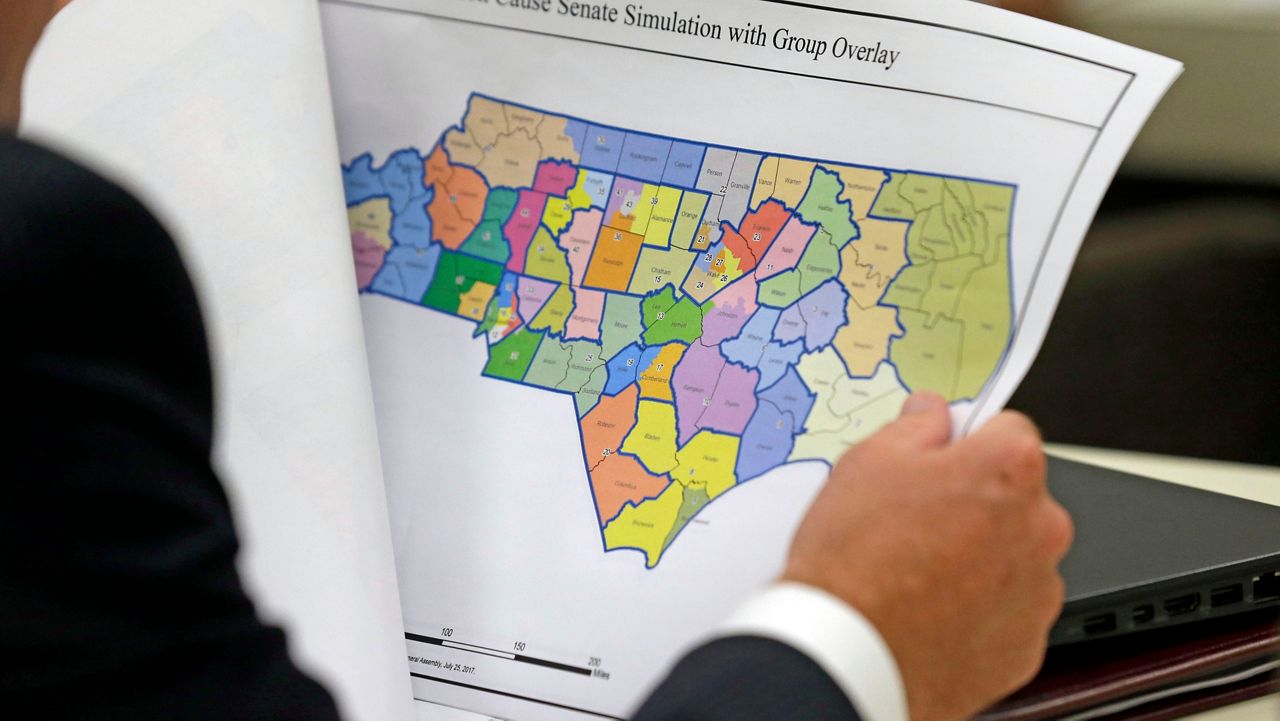The North Carolina Supreme Court, with its new Republican majority, issued two new rulings in major elections cases Friday. The court overturned rulings the same court made last year under its Democratic majority on voter ID and redistricting.
The court ruled that a 2018 law requiring in-person voters to show ID would be allowed to go into effect. The five Republican justices found the voter ID law does not discriminate based on race.
In a separate ruling, the court threw out an earlier decision on gerrymandered redistricting maps. Those maps, created by the General Assembly, set districts to elect members of the state legislature and North Carolina’s 14 congressional districts.
The redistricting ruling is a victory for Republicans in the legislature, who will now be free to draw new redistricting maps without worrying they will be overturned by the North Carolina Supreme Court.
The state Supreme Court decided both of these cases last year when it had a 4-3 Democratic majority. After the last election, a new 5-2 majority of Republicans took control of the court.
The court took the rare step of reopening the cases earlier this year after a request from GOP leaders in the General Assembly. The move was seen as underscoring the partisan nature of the state’s top court.
Since 1993, the court has agreed to rehearings in just two cases, according to Justice Anita Earls.
“The majority’s order fails to acknowledge the radical break with 205 years of history that the decision to rehear this case represents,” Earls wrote in a dissenting opinion when the court agreed to reopen the cases.
The Supreme Court heard new arguments in the redistricting and voter ID cases in March.
Based on Friday’s ruling from the N.C. Supreme Court, voters will be required to show ID to cast an in-person ballot in future elections.
The voter ID case centers on a 2018 law passed by the General Assembly. The law requires in-person voters to show photo identification, like a driver’s license or a passport.
The debate over voter ID in North Carolina has been going on for more than a decade. The General Assembly first passed a voter ID law in 2013, but that was overturned by a federal court.
The N.C. Supreme Court struck down the 2018 voter ID law last year, finding that it discriminated based on race. But the new decision reverses that ruling.
"The people of North Carolina overwhelmingly support voter identification and other efforts to promote greater integrity and confidence in our elections," Justice Phil Berger Jr., a Republican, wrote in the decision released Friday.
"Plaintiffs here have failed to prove beyond a reasonable doubt that S.B. 824 was enacted with discriminatory intent or that the law actually produces a meaningful disparate impact along racial lines," Berger wrote in the opinion.
In a dissenting opinion, the two Democrats on the court criticized the ruling for discounting evidence that requiring ID makes it harder for minorities to vote. They also argued the case never should have been reopened in the first place.
"Our precedent, stretching back nearly 150 years into this Court’s history, makes it exceedingly clear that those few and distinguished cases brought back before the Court for rehearing ought to be reconsidered only with tremendous caution," wrote Justice Michael Morgan, a Democrat. He was joined in the dissent by the other liberal on the court, Earls.
The five Republicans on the court decided the majority opinion.
"Plaintiffs failed to produce any witness who could testify to the General Assembly’s alleged discriminatory intent or otherwise rebut the presumption of good faith," Berger wrote.
"The named plaintiffs can all obtain free identification cards that can be used for eleven years and, even if they fail to do so, can cast provisional ballots that will be counted if they comply with the forgiving requirements of S.B. 824," he wrote.
Once a decade, after new census numbers come out, the state legislature is tasked with redistricting. That’s the process of drawing new district maps for the N.C. House and Senate and the state’s congressional districts.
How districts are drawn can be a deciding factor in which party gets elected in each district. Before the 2022 elections, the N.C. Supreme Court forced the General Assembly to redraw their maps. A trial court used its own special master to draw the districts for North Carolina’s 14 congressional districts.
Experts said the congressional map from the General Assembly would have likely led to 10 Republicans and 4 Democrats being elected to Congress from North Carolina last year. This is in a purple state that is more or less evenly divided between Republicans and Democrats.
Donald Trump won in North Carolina in 2020, but voters also reelected Democratic Gov. Roy Cooper.
The issue at the court ultimately comes down to partisan gerrymanders. Essentially, gerrymandering means drawing the maps to favor one group over another.
“Four members of this Court wrongly held that partisan gerrymandering claims are justiciable and violate provisions of the Declaration of Rights in the North Carolina Constitution,” Chief Justice Paul Newby wrote in the majority opinion released Friday.
“This Court then also erroneously declared that the 2021 Plans were unconstitutional partisan gerrymanders,” Newby wrote.
The ruling said partisan gerrymandering, drawing the maps to favor one political party over another, is not an issue for the courts.
“Courts are not intended to meddle in policy matters,” Newby wrote. The ruling gives the General Assembly the green light to draw new maps for the state legislature and Congress.
In a dissenting opinion, Earls disagreed: “This Court rejected the idea that the voters of this state must be hostage to the partisan objectives of the ruling party in the General Assembly.”
“Unchecked partisan gerrymandering allows the controlling party of the General Assembly to draw legislative redistricting plans in a way that dilutes the voting power of voters in the disfavored party. In so doing, those who hold political power can guarantee that they remain in office for decades, making them impervious to the popular will,” Earls wrote in the minority opinion.
When the N.C. Supreme Court decided the redistricting lawsuit last year and forced a redraw of the maps, Republican leaders in the General Assembly appealed to the U.S. Supreme Court.
That appeal may now be moot and the U.S. Supreme Court may drop the case.
The arguments at the U.S. Supreme Court brought national attention to North Carolina’s redistricting saga. Lawyers for the legislature based their argument on the “independent legislature theory,” which was once considered a fringe theory.
The theory is that state legislatures are solely in charge of federal elections and courts have no oversight.
It is based on Article 1, Section 4 of the U.S. Constitution, which reads: “The times, places and manner of holding elections for senators and representatives shall be prescribed in each state by the legislature.”
Many groups, especially on the left, were concerned that this could take away any checks and balances between state legislatures and the courts on federal election issues.
The new ruling by the N.C. Supreme Court could allow the U.S. Supreme Court to sidestep the question and dismiss the appeal. Last month the U.S. Supreme Court asked the parties in the case to file written arguments on whether the case should proceed.
Lawmakers and advocacy groups on both sides of the aisle reacted quickly to the rulings from the N.C. Supreme Court. The reactions were divided on predictable partisan lines.
“As a member of the North Carolina State Senate who helped bring this bill forward, I say it’s high time the court has recognized the will of the people and restored common sense to our elections process,” Rep. Chuck Edwards, a Republican, said in a statement Friday.
“There is no good reason why an ID should not be necessary to perform our most sacred civic duty and participate in our democratic process,” he said.
“For years plaintiffs and activist courts have manipulated our Constitution to achieve policy outcomes that could not be won at the ballot box. Today’s rulings affirm that our Constitution cannot be exploited to fit the political whims of left-wing Democrats,” N.C. Senate leader Phil Berger, a Republican, said in a statement.
Democrats criticized the rulings.
“Partisan gerrymandering serves one purpose: silencing the voices of voters for political gain. While I am not surprised this was the ruling made by the conservative justices on our Supreme Court, this decision is a shocking break from precedent and violation of our constitution that could destroy any chance we have for fair maps,” Rep. Deborah Ross, a Democrat, said in a statement.
In a brief statement on social media, the governor said, “The Republican State Supreme Court has ignored the constitution and followed the marching orders of the Republican legislature by declaring open season for their extreme partisan gerrymandering and is destroying the court’s reputation for independence.”
“Republican legislators wanted a partisan court that would issue partisan opinions and that’s exactly what this is,” Cooper said.









)